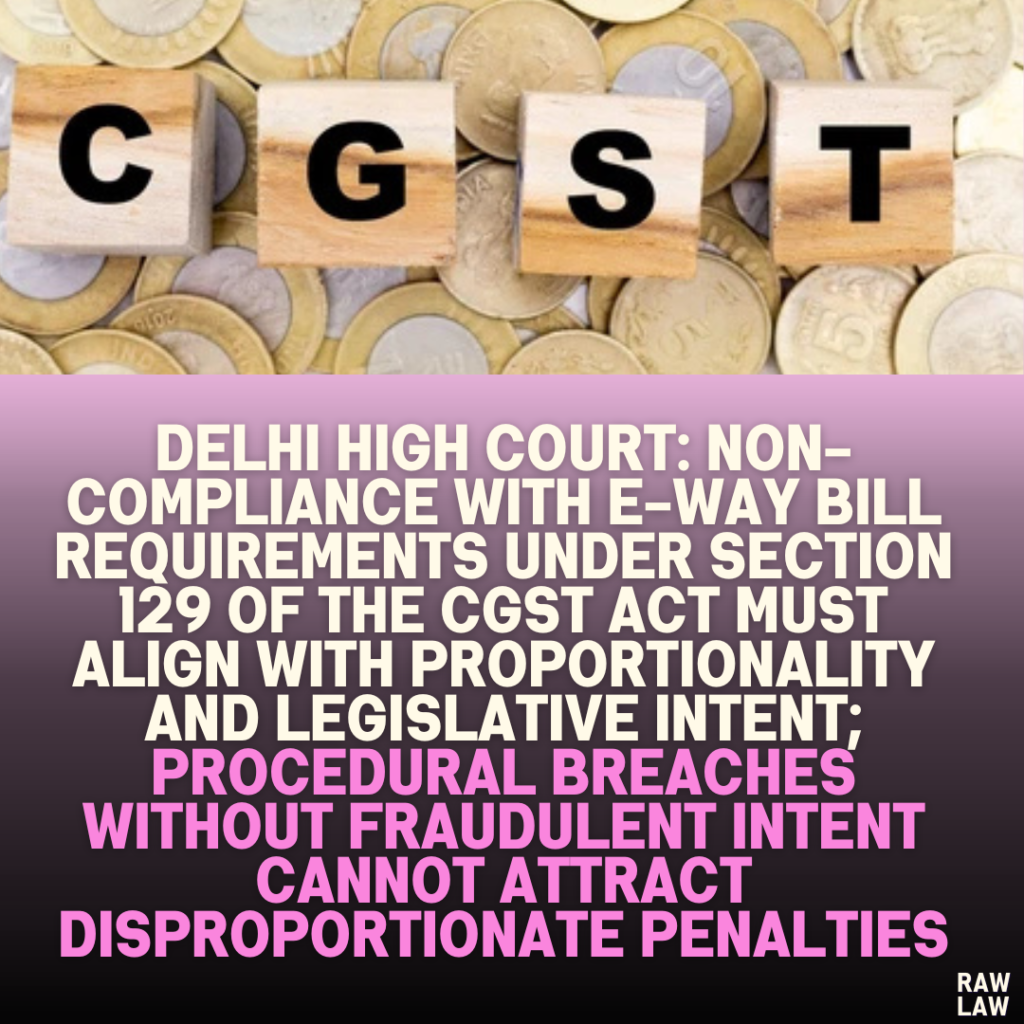Court’s Decision
The Delhi High Court clarified that Section 129 of the Central Goods and Services Tax (CGST) Act, 2017, which deals with the detention, seizure, and release of goods during transit, cannot be used to impose arbitrary or disproportionate penalties for procedural breaches. The court held that penalties must be guided by the principles laid out in Section 126, which emphasizes proportionality and moderation, especially for minor and rectifiable breaches without fraudulent intent.
Facts
- Case Background:
- The petitioners, Kamal Envirotech Pvt. Ltd. and M/s Zeon Life Sciences Ltd., approached the court to challenge the imposition of penalties under Section 129 of the CGST Act.
- Their goods were detained during transit for alleged violations related to incomplete E-Way Bills (EWB).
- Details of Incidents:
- Kamal Envirotech: Imported goods from Italy, which were detained on the ground that Part B of the EWB was incomplete. Although the error was rectified the next day, a penalty of INR 19,80,000 was imposed.
- Zeon Life Sciences: Goods were intercepted during transit, and an incomplete EWB was cited as the violation. Despite having the option to seek an extension as per the CGST Rules, a penalty of INR 5,28,000 was imposed.
- Both petitioners contested these penalties, arguing they were disproportionate and unwarranted given the absence of intent to evade taxes.
Issues
- Does Section 129 create an absolute penalty regime that overrides principles of moderation under Section 126?
- Should procedural breaches, such as incomplete documentation without fraudulent intent, attract heavy penalties under Section 129?
Petitioners’ Arguments
- Procedural Nature of Breaches:
- The breaches involved procedural errors (incomplete EWB) rather than substantive violations like tax evasion.
- Section 126 classifies minor, rectifiable errors without fraudulent intent as exempt from heavy penalties.
- Applicability of Other Provisions:
- Section 122(1)(xiv) stipulates a fixed penalty of INR 10,000 for transporting taxable goods without documents.
- Section 125 provides a maximum penalty of INR 25,000 for unspecified contraventions.
- Disproportionate Penalties:
- Penalties under Section 129, amounting to 200% of the tax payable, were arbitrary and excessive given the nature of the infractions.
Respondents’ Arguments
- Non-Obstante Clause in Section 129:
- Section 129 begins with a non-obstante clause (“notwithstanding anything contained in this Act”), indicating that it overrides other provisions, including Sections 125 and 126.
- This provision, they argued, acts as a deterrent and imposes strict penalties for any contravention during the transit of goods.
- Penalty as Deterrence:
- The penalties imposed were necessary to ensure compliance and deter violations, regardless of intent or severity.
Analysis of the Law
- Scope of Section 129:
- Section 129 addresses the detention, seizure, and release of goods during transit in cases of contravention.
- The provision allows for penalties equal to 200% of the tax payable or 50% of the value of goods, whichever is higher.
- Moderation under Section 126:
- Section 126 mandates that penalties should be proportional to the breach’s severity and should not apply to minor or rectifiable errors made without fraudulent intent.
- It defines “minor breaches” as involving a tax amount under INR 5,000 or errors that are easily rectifiable.
- Non-Obstante Clause Interpretation:
- The court emphasized that the non-obstante clause in Section 129 does not give it unlimited authority to override principles of fairness and moderation under Section 126.
- Non-obstante clauses must be interpreted in context and cannot be used to annul other provisions of the same statute.
- Legislative Intent:
- The legislature intended to distinguish between serious infractions (e.g., tax evasion) and minor procedural breaches.
- Penalties should deter fraudulent conduct without penalizing taxpayers for minor, technical errors.
Precedent Analysis
- Hindustan Steel Ltd. v. State of Orissa (1969):
- Penalties should not be imposed for technical or venial breaches or acts done under a bona fide belief.
- Synergy Fertichem P. Ltd. v. State of Gujarat (2019):
- The Gujarat High Court ruled that procedural breaches without intent to evade tax should not attract penalties under Section 129.
- R.S. Raghunath v. State of Karnataka (1992):
- Non-obstante clauses must be interpreted strictly and harmoniously with the statute’s overall objectives.
Court’s Reasoning
- Proportionality:
- Section 126 explicitly prohibits imposing penalties for minor, rectifiable breaches without fraudulent intent or gross negligence.
- Even under Section 129, procedural breaches like incomplete documentation that are promptly rectified do not warrant heavy penalties.
- Limits of Non-Obstante Clause:
- The court rejected the respondents’ argument that the non-obstante clause in Section 129 overrides Section 126 entirely.
- Non-obstante clauses cannot be used to nullify other statutory provisions unless there is a clear inconsistency.
- Contextual Application:
- Section 129 is meant to regulate detention and release of goods during transit, not to penalize every minor procedural lapse disproportionately.
- The respondents’ interpretation would lead to arbitrary penalties, undermining the CGST Act’s broader principles.
Conclusion
The Delhi High Court quashed the penalties imposed under Section 129. It ruled that procedural breaches, like incomplete EWB entries corrected promptly, should be evaluated under Section 126, emphasizing proportionality and legislative intent.
Implications
- Taxpayer Protection:
- The judgment reinforces that procedural breaches without fraudulent intent should not attract draconian penalties.
- Balanced Enforcement:
- It underscores the need for tax authorities to exercise discretion and adhere to statutory principles of fairness and proportionality.
